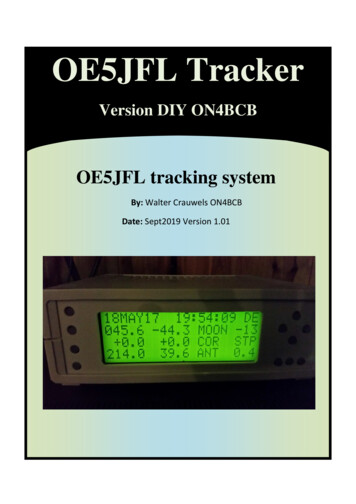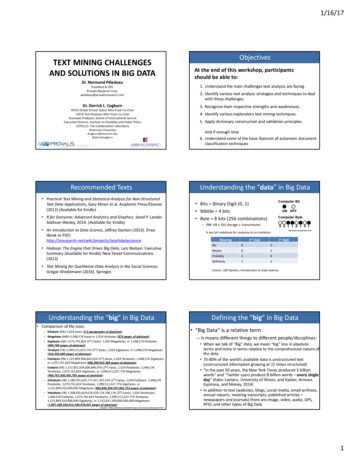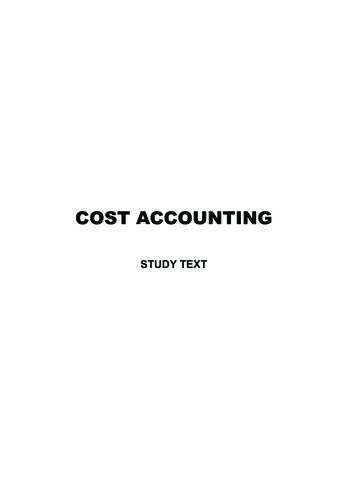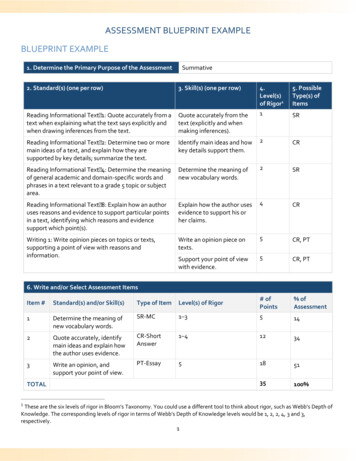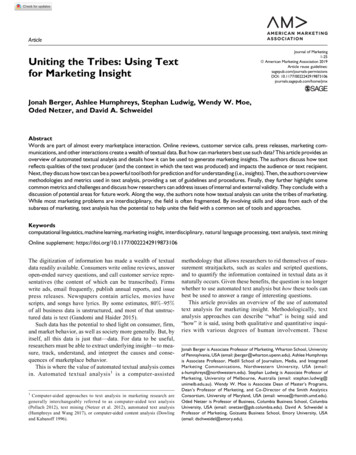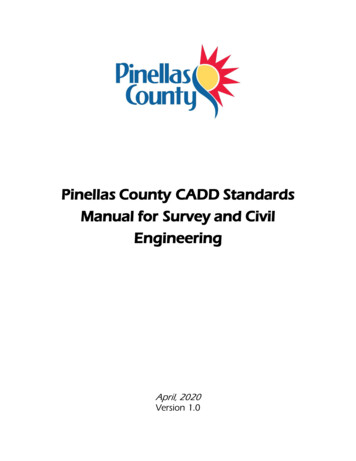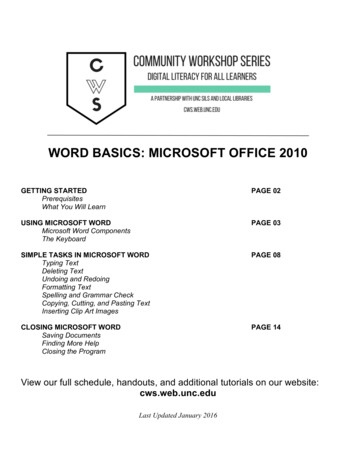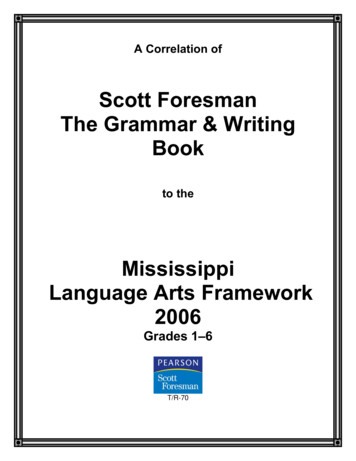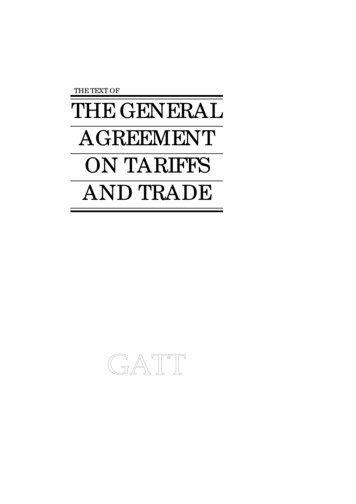
Transcription
THE TEXT OFTHE GENERALAGREEMENTON TARIFFSAND TRADE
GENERAL AGREEMENTON TARIFFS AND TRADEText ofthe General AgreementGENEVA, JULY 1986
PREFACEThe General Agreement on Tariffs and Trade came into force on 1January 1948. This booklet contains the complete text of the GeneralAgreement together with all amendments which have become effectivesince its entry into force. The text is identical to that published, since 1969,as Volume IV in the series Basic Instruments and Selected Documents. Aguide to the legal sources of the provisions of the Agreement is providedin an appendix. An Analytical Index, containing notes on the drafting,interpretation and application of the articles of the Agreement has beenprepared and published by the secretariat. A second publication,complementary to this one, contains the text of the agreements reached asa result of the Tokyo Round of Multilateral Trade Negotiations (19731979).The General Agreement is applied "provisionally" by all contractingparties. The original contracting parties, and also those former territoriesof Belgium, France, the Netherlands and the United Kingdom which, afterattaining independence, acceded to the General Agreement under ArticleXXVI:5(c), apply the GATT under the Protocol of Provisional Application,the text of which is reproduced in this volume. Chile applies the GeneralAgreement under a Special Protocol of September 1948. The contractingparties which have acceded since 1948 apply the General Agreementunder their respective Protocols of Accession.For the convenience of the reader, asterisks mark the portions of thetext which should be read in conjunction with notes and supplementaryprovisions in Annex I to the Agreement. In accordance with ArticleXXXIV, Annexes A to I are an integral part of the Agreement. TheSchedules of tariff concessions annexed to the General Agreement (nothere reproduced) are also, in accordance with Article II:7, an integral partof the Agreement.By the Decision of 23 March 1965, the CONTRACTING PARTIES changedthe title of the head of the GATT secretariat from "Executive Secretary" to"Director-General". However, in the absence of an amendment to theGeneral Agreement to take account of this change, the title "ExecutiveSecretary" has been retained in the text of Articles XVIII:12(e), XXIII:2 andXXVI:4, 5 and 6. The Decision of 23 March 1965 provides that the dutiesand powers conferred upon the Executive Secretary by the GeneralAgreement "shall be exercised by the person holding the position ofDirector-General, who shall, for this purpose, also hold the position ofExecutive Secretary".
TABLE OF CONTENTSPagePREFACE . . . . . . . . . . iiiTEXT OF THE GENERAL AGREEMENT ON TARIFFS AND TRADEPREAMBLE . . . . . . . .1PART IArticle IArticle IIGeneral Most-Favoured-Nation Treatment. . . 2Schedules of Concessions . . . . 3PART IIArticle IIIArticle IVArticle VArticle VIArticle VIIArticle VIIIArticle IXArticle XArticle XIArticle XIIArticle XIIIArticle XIVArticle XVArticle XVIArticle XVIIArticle XVIIIArticle XIXArticle XXArticle XXIArticle XXIIArticle XXIIINational Treatment on Internal Taxation andRegulation . . . . 6Special Provisions relating to CinematographFilms . . . . 8Freedom of Transit . . . . 8Anti-dumping and Countervailing Duties .10Valuation for Customs Purposes . . . 12Fees and Formalities connected with Importationand Exportation . . . . 14Marks of Origin . . . . 15Publication and Administration of TradeRegulations . . . . 16General Elimination of Quantitative Restrictions . . 17Restrictions to Safeguard the Balance of Payments . . . . 18Non-discriminatory Administration of Quantitative restrictions . . . . 21Exceptions to the rule of Non-discrimination . . 23Exchange Arrangements. . . . 24Subsidies . . . . 26State Trading Enterprises . . . . 27Governmental Assistance to Economic Development . . . . 28Emergency Action on Imports of Particular Products . . . . 36General Exceptions. . . . 37Security Exceptions . . . . 38Consultation . . . . 39Nullification of Impairment . . . . 39
VITABLE OF CONTENTSPagePART IIIArticle XXIVArticle XXVArticle XXVIArticle XXVIIArticle XXVIIIArticle XXVIII bisArticle XXIXArticle XXXArticle XXXIArticle XXXIIArticle XXXIIIArticle XXXIVArticle XXXVPART IVTerritorial Application Frontier Traffic Customs Unions and Free-trade Areas . . . 41Joint Action by the Contracting Parties . . . 44Acceptance. Entry into Force and Registration . . 45Withholding or Withdrawal of Concessions . . 46Modification of Schedules . . . . 46Tariff Negotiations . . . . 48The Relation of this Agreement to the HavanaCharter. . . . 49Amendments . . . . 50Withdrawal . . . . 51Contracting Parties . . . . 51Accession . . . . 51Annexes . . . .Non-application of the Agreement between Particular Contracing Parties . . . . 52TRADE AND DEVELOPMENTArticle XXXVIPrinciples and Objectives . . . . 53Article XXXVIICommitments . . . . 55Article XXXVIIIJoint Action . . . . 56Annexes A to G Relating to Article I . . . . 58Annexe HRelating to Article XXVI . . . . 60Annexe INotes and Supplementary Provisions . . . 62PROTOCOL OF PROVISIONAL APPLICATION . . . . 77APPENDIX . . . . . . . . . . 79I.Source and Effective Date of GATT Provisions . . . 81II.Key to Abbreviations used in this Appendix and to Provisions inSupplementary Agreements affecting the Application of CertainPortions of the General Agreement . . . . 8952
THE GENERAL AGREEMENTON TARIFFS AND TRADEThe Governments of the COMMONWEALTH OF AUSTRALIA, theKKINGDOM OF BELGIUM, the UNITED STATES OF BRAZIL, BURMA, CANADA,CEYLON, the REPUBLIC OF CHILE, the REPUBLIC OF CHINA, the REPUBLIC OFCUBA, the CZECHOSLOVAK REPUBLIC, the FRENCH REPUBLIC, INDIA,LEBANON, the GRAND-DUCHY OF LUXEMBURG, the KINGDOM OF THENETHERLANDS, NEW ZEALAND, the KINGDOM OF NORWAY, PAKISTAN,SOUTHERN RHODESIA, SYRIA, the UNION OF SOUTH AFRICA, the UNITEDKINGDOM OF GREAT BRITAIN AND NORTHERN IRELAND, and the UNITEDSTATES OF AMERICA:Recognizing that their relations in the field of trade and economicendeavour should be conducted with a view to raising standards of living,ensuring full employment and a large and steadily growing volume ofreal income and effective demand, developing the full use of the resourcesof the world and expanding the production and exchange of goods,Being desirous of contributing to these objectives by entering intoreciprocal and mutually advantageous arrangements directed to thesubstantial reduction of tariffs and other barriers to trade and to theelimination of discriminatory treatment in international commerce,Have through their Representatives agreed as follows:1
PART IArticle IGeneral Most-Favoured-Nation Treatment1. With respect to customs duties and charges of any kind imposedon or in connection with importation or exportation or imposed on theinternational transfer of payments for imports or exports, and with respectto the method of levying such duties and charges, and with respect to allrules and formalities in connection with importation and exportation, andwith respect to all matters referred to in paragraphs 2 and 4 of Article III,*any advantage, favour, privilege or immunity granted by any contractingparty to any product originating in or destined for any other country shallbe accorded immediately and unconditionally to the like productoriginating in or destined for the territories of all other contracting parties.2. The provisions of paragraph 1 of this Article shall not require theelimination of any preferences in respect of import duties or chargeswhich do not exceed the levels provided for in paragraph 4 of this Articleand which fall within the following descriptions:(a) Preferences in force exclusively between two or more of theterritories listed in Annex A, subject to the conditions set forththerein;(b) Preferences in force exclusively between two or more territorieswhich on July 1, 1939, were connected by common sovereignty orrelations of protection or suzerainty and which are listed inAnnexes B, C and D, subject to the conditions set forth therein;(c) Preferences in force exclusively between the United States ofAmerica and the Republic of Cuba;(d) Preferences in force exclusively between neighbouring countrieslisted in Annexes E and F.3. The provisions of paragraph 1 shall not apply to preferencesbetween the countries formerly a part of the Ottoman Empire anddetached from it on July 24, l923, provided such preferences are approvedunder paragraph 5† of Article XXV, which shall be applied in this respectin the light of paragraph 1 of Article XXIX.†The authentic text erroneously reads "sub-paragraph 5 (a)".2
ARTICLES I AND II34. The margin of preference* on any product in respect of which apreference is permitted under paragraph 2 of this Article but is notspecifically set forth as a maximum margin of preference in theappropriate Schedule annexed to this Agreement shall not exceed:(a) in respect of duties or charges on any product described in suchSchedule, the difference between the most-favoured-nation andpreferential rates provided for therein; if no preferential rate isprovided for, the preferential rate shall for the purposes of thisparagraph be taken to be that in force on April 10, l947, and, if nomost-favoured-nation rate is provided for, the margin shall notexceed the difference between the most-favoured-nation andpreferential rates existing on April 10, 1947;(b) in respect of duties or charges on any product not described inthe appropriate Schedule, the difference between the mostfavoured-nation and preferential rates existing on April 10, 1947.In the case of the contracting parties named in Annex G, the date of April10, 1947, referred to in sub-paragraph (a) and (b) of this paragraph shall bereplaced by the respective dates set forth in that Annex.Article IISchedules of Concessions1. (a) Each contracting party shall accord to the commerce of theother contracting parties treatment no less favourable than that providedfor in the appropriate Part of the appropriate Schedule annexed to thisAgreement.(b) The products described in Part I of the Schedule relating toany contracting party, which are the products of territories of othercontracting parties, shall, on their importation into the territory to whichthe Schedule relates, and subject to the terms, conditions or qualificationsset forth in that Schedule, be exempt from ordinary customs duties inexcess of those set forth and provided therein. Such products shall also beexempt from all other duties or charges of any kind imposed on or inconnection with the importation in excess of those imposed on the date ofthis Agreement or those directly and mandatorily required to be imposedthereafter by legislation in force in the importing territory on that date.(c) The products described in Part II of the Schedule relating toany contracting party which are the products of territories entitled underArticle I to receive preferential treatment upon importation into theterritory to which the Schedule relates shall, on their importation into suchterritory, and subject to
4ARTICLE IIthe terms, conditions or qualifications set forth in that Schedule, be exemptfrom ordinary customs duties in excess of those set forth and provided forin Part II of that Schedule. Such products shall also be exempt from allother duties or charges of any kind imposed on or in connection withimportation in excess of those imposed on the date of this Agreement orthose directly or mandatorily required to be imposed thereafter bylegislation in force in the importing territory on that date. Nothing in thisArticle shall prevent any contracting party from maintaining itsrequirements existing on the date of this Agreement as to the eligibility ofgoods for entry at preferential rates of duty.2. Nothing in this Article shall prevent any contracting party fromimposing at any time on the importation of any product:(a) a charge equivalent to an internal tax imposed consistently withthe provisions of paragraph 2 of Article III* in respect of the likedomestic product or in respect of an article from which theimported product has been manufactured or produced in wholeor in part;(b) any anti-dumping or countervailing duty applied consistentlywith the provisions of Article VI;*(c) fees or other charges commensurate with the cost of servicesrendered.3. No contracting party shall alter its method of determiningdutiable value or of converting currencies so as to impair the value of anyof the concessions provided for in the appropriate Schedule annexed tothis Agreement.4. If any contracting party establishes, maintains or authorizes,formally or in effect, a monopoly of the importation of any productdescribed in the appropriate Schedule annexed to this Agreement, suchmonopoly shall not, except as provided for in that Schedule or asotherwise agreed between the parties which initially negotiated theconcession, operate so as to afford protection on the average in excess ofthe amount of protection provided for in that Schedule. The provisions ofthis paragraph shall not limit the use by contracting parties of any form ofassistance to domestic producers permitted by other provisions of thisAgreement.*5. If any contracting party considers that a product is not receivingfrom another contracting party the treatment which the first contractingparty believes to have been contemplated by a concession provided for inthe appropriate Schedule annexed to this Agreement, it shall bring thematter directly to the attention of the other contracting party. If the latteragrees that the treatment contemplated was that claimed by the firstcontracting party, but declares that such treatment cannot be accordedbecause a court or other proper authority has
ARTICLE II5ruled to the effect that the product involved cannot be classified under thetariff laws of such contracting party so as to permit the treatmentcontemplated in this Agreement, the two contracting parties, togetherwith any other contracting parties substantially interested, shall enterpromptly into further negotiations with a view to a compensatoryadjustment of the matter.6. (a) The specific duties and charges included in the Schedulesrelating to contracting parties members of the International MonetaryFund, and margins of preference in specific duties and chargesmaintained by such contracting parties, are expressed in the appropriatecurrency at the par value accepted or provisionally recognized by theFund at the date of this Agreement. Accordingly, in case this par value isreduced consistently with the Articles of Agreement of the InternationalMonetary Fund by more than twenty per centum, such specific duties andcharges and margins of preference may be adjusted to take account ofsuch reduction; provided that the CONTRACTING PARTIES (i.e., thecontracting parties acting jointly as provided for in Article XXV) concurthat such adjustments will not impair the value of the concessionsprovided for in the appropriate Schedule or elsewhere in this Agreement,due account being taken of all factors which may influence the need for, orurgency of, such adjustments.(b) Similar provisions shall apply to any contracting party not amember of the Fund, as from the date on which such contracting partybecomes a member of the Fund or enters into a special exchangeagreement in pursuance of Article XV.7. The Schedules annexed to this Agreement are hereby made anintegral part of Part I of this Agreement.
PART IIArticle III*National Treatment on Internal Taxation and Regulation1. The contracting parties recognize that internal taxes and otherinternal charges, and laws, regulations and requirements affecting theinternal sale, offering for sale, purchase, transportation, distribution or useof products, and internal quantitative regulations requiring the mixture,processing or use of products in specified amounts or proportions, shouldnot be applied to imported or domestic products so as to afford protectionto domestic production.*2. The products of the territory of any contracting party importedinto the territory of any other contracting party shall not be subject,directly or indirectly, to internal taxes or other internal charges of any kindin excess of those applied, directly or indirectly, to like domestic products.Moreover, no contracting party shall otherwise apply internal taxes orother internal charges to imported or domestic products in a mannercontrary to the principles set forth in paragraph 1.*3. With respect to any existing internal tax which is inconsistentwith the provisions of paragraph 2, but which is specifically authorizedunder a trade agreement, in force on April 10, l947, in which the importduty on the taxed product is bound against increase, the contracting partyimposing the tax shall be free to postpone the application of the provisionsof paragraph 2 to such tax until such time as it can obtain release from theobligations of such trade agreement in order to permit the increase of suchduty to the extent necessary to compensate for the elimination of theprotective element of the tax.4. The products of the territory of any contracting party importedinto the territory of any other contracting party shall be accordedtreatment no less favourable than that accorded to like products ofnational origin in respect of all laws, regulations and requirementsaffecting their internal sale, offering for sale, purchase, transportation,distribution or use. The provisions of this paragraph shall not prevent theapplication of differential internal transportation charges which are basedexclusively on the economic operation of the means of transport and noton the nationality of the product.6
ARTICLE III75. No contracting party shall establish or maintain any internalquantitative regulation relating to the mixture, processing or use ofproducts in specified amounts or proportions which requires, directly orindirectly, that any specified amount or proportion of any product whichis the subject of the regulation must be supplied from domestic sources.Moreover, no contracting party shall otherwise apply internal quantitativeregulations in a manner contrary to the principles set forth in paragraph1.*6. The provisions of paragraph 5 shall not apply to any internalquantitative regulation in force in the territory of any contracting party onJuly 1, 1939, April 10, 1947, or March 24, l948, at the option of thatcontracting party; Provided that any such regulation which is contrary tothe provisions of paragraph 5 shall not be modified to the detriment ofimports and shall be treated as a customs duty for the purpose ofnegotiation.7. No internal quantitative regulation relating to the mixture,processing or use of products in specified amounts or proportions shall beapplied in such a manner as to allocate any such amount or proportionamong external sources of supply.8. (a) The provisions of this Article shall not apply to laws,regulations or requirements governing the procurement by governmentalagencies of products purchased for governmental purposes and not with aview to commercial resale or with a view to use in the production ofgoods for commercial sale.(b) The provisions of this Article shall not prevent the paymentof subsidies exclusively to domestic producers, including payments todomestic producers derived from the proceeds of internal taxes or chargesapplied consistently with the provisions of this Article and subsidieseffected through governmental purchases of domestic products.9. The contracting parties recognize that internal maximum pricecontrol measures, even though conforming to the other provisions of thisArticle, can have effects prejudicial to the interests of contracting partiessupplying imported products. Accordingly, contracting parties applyingsuch measures shall take account of the interests of exporting contractingparties with a view to avoiding to the fullest practicable extent suchprejudicial effects.10. The provisions of this Article shall not prevent any contractingparty from establishing or maintaining internal quantitative regulationsrelating to exposed cinematograph films and meeting the requirements ofArticle IV.
8ARTICLES IV AND VArticle IVSpecial Provisions relating to Cinematograph FilmsIf any contracting party establishes or maintains internal quantitativeregulations relating to exposed cinematograph films, such regulationsshall take the form of screen quotas which shall conform to the followingrequirements:(a) Screen quotas may require the exhibition of cinematograph filmsof national origin during a specified minimum proportion of thetotal screen time actually utilized, over a specified period of notless than one year, in the commercial exhibition of all films ofwhatever origin, and shall be computed on the basis of screentime per theatre per year or the equivalent thereof;(b) With the exception of screen time reserved for films of nationalorigin under a screen quota, screen time including that releasedby administrative action from screen time reserved for films ofnational origin, shall not be allocated formally or in effect amongsources of supply;(c) Notwithstanding the provisions of sub-paragraph (b) of thisArticle, any contracting party may maintain screen quotasconforming to the requirements of sub-paragraph (a) of thisArticle which reserve a minimum proportion of screen time forfilms of a specified origin other than that of the contracting partyimposing such screen quotas; Provided that no such minimumproportion of screen time shall be increased above the level ineffect on April 10, 1947;(d) Screen quotas shall be subject to negotiation for their limitation,liberalization or elimination.Article VFreedom of Transit1. Goods (including baggage), and also vessels and other means oftransport, shall be deemed to be in transit across the territory of acontracting party when the passage across such territory, with or withouttrans-shipment, warehousing, breaking bulk, or change in the mode oftransport, is only a portion of a complete journey beginning andterminating beyond the frontier of the contracting party across whoseterritory the traffic passes. Traffic of this nature is termed in this article"traffic in transit".
ARTICLE V92. There shall be freedom of transit through the territory of eachcontracting party, via the routes most convenient for international transit,for traffic in transit to or from the territory of other contracting parties. Nodistinction shall be made which is based on the flag of vessels, the place oforigin, departure, entry, exit or destination, or on any circumstancesrelating to the ownership of goods, of vessels or of other means oftransport.3. Any contracting party may require that traffic in transit throughits territory be entered at the proper custom house, but, except in cases offailure to comply with applicable customs laws and regulations, suchtraffic coming from or going to the territory of other contracting partiesshall not be subject to any unnecessary delays or restrictions and shall beexempt from customs duties and from all transit duties or other chargesimposed in respect of transit, except charges for transportation or thosecommensurate with administrative expenses entailed by transit or withthe cost of services rendered.4. All charges and regulations imposed by contracting parties ontraffic in transit to or from the territories of other contracting parties shallbe reasonable, having regard to the conditions of the traffic.5. With respect to all charges, regulations and formalities inconnection with transit, each contracting party shall accord to traffic intransit to or from the territory of any other contracting party treatment noless favourable than the treatment accorded to traffic in transit to or fromany third country.*6. Each contracting party shall accord to products which have beenin transit through the territory of any other contracting party treatment noless favourable than that which would have been accorded to suchproducts had they been transported from their place of origin to theirdestination without going through the territory of such other contractingparty. Any contracting party shall, however, be free to maintain itsrequirements of direct consignment existing on the date of thisAgreement, in respect of any goods in regard to which such directconsignment is a requisite condition of eligibility for entry of the goods atpreferential rates of duty or has relation to the contracting party'sprescribed method of valuation for duty purposes.7. The provisions of this Article shall not apply to the operation ofaircraft in transit, but shall apply to air transit of goods (includingbaggage).
10ARTICLE VIArticle VIAnti-dumping and Countervailing Duties1. The contracting parties recognize that dumping, by whichproducts of one country are introduced into the commerce of anothercountry at less than the normal value of the products, is to be condemnedif it causes or threatens material injury to an established industry in theterritory of a contracting party or materially retards the establishment of adomestic industry. For the purposes of this Article, a product is to beconsidered as being introduced into the commerce of an importingcountry at less than its normal value, if the price of the product exportedfrom one country to another(a) is less than the comparable price, in the ordinary course of trade,for the like product when destined for consumption in theexporting country, or,(b) in the absence of such domestic price, is less than either(i)the highest comparable price for the like product for exportto any third country in the ordinary course of trade, or(ii) the cost of production of the product in the country of originplus a reasonable addition for selling cost and profit.Due allowance shall be made in each case for differences in conditions andterms of sale, for differences in taxation, and for other differences affectingprice comparability.*2. In order to offset or prevent dumping, a contracting party maylevy on any dumped product an anti-dumping duty not greater in amountthan the margin of dumping in respect of such product. For the purposesof this Article, the margin of dumping is the price difference determinedin accordance with the provisions of paragraph 1.*3. No countervailing duty shall be levied on any product of theterritory of any contracting party imported into the territory of anothercontracting party in excess of an amount equal to the estimated bounty orsubsidy determined to have been granted, directly or indirectly, on themanufacture, production or export of such product in the country oforigin or exportation, including any special subsidy to the transportationof a particular pro
the general agreement on tariffs and trade the governments of the commonwealth of australia, the kkingdom of belgium, the united states of brazil, burma, canada, ceylon, the republic of chile, the republic of china, the republic of cuba, the czechoslovak republic, the french republic, india, lebanon, the grand-duchy of luxe

